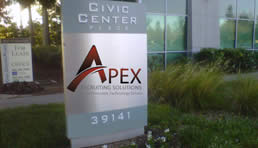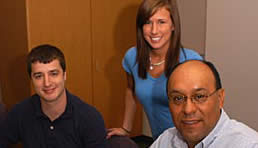




Salem-Keizer’s 260 bus drivers cover 20,000 miles and use 3,000 gallons of fuel every day to bring thousands of kids to school.

Alan Booth inspects his bus’ lights before starting his morning route. (Rachel Alexander/Salem Reporter)
Alan Booth is now used to no one knowing his name at work.
“Bus driver! Can you turn the heater off?”
The question was yelled out from the back of Booth’s 40-foot school bus. Booth turned the heater on when he began his first route at 6:15 that morning, but by 8, his Schirle Elementary School charges were too hot.
“It’s done!” he called back. “Did I hear a thank you?”
“Thank you!” the student responded.
Booth is one of Salem-Keizer’s 260 bus drivers transporting students safely to and from school each day.
A handful of students call him Alan, but it’s rare.
“Most of them call me bus driver, and that’s okay,” he said.
The district’s bus network is among the largest in the state, covering 20,000 miles and burning 3,000 gallons of fuel daily. Salem-Keizer covers 178 square miles, and drivers haul about 20,000 riders every day, said Michael Shields, the district transportation director.
Getting students to school requires a team. Site coordinators, routers, dispatchers, mechanics and trainers make sure things run smoothly and step in to cover routes when regular drivers are sick.
(Photo gallery: A day in the life)
Booth came to the district after 30 years working in federal prisons, most recently as an administrator in Sheridan.
He retired, but quickly found he was bored, so eight months later he applied to drive a bus. Corralling energetic elementary school students isn’t quite the same as managing federal prisoners, but Booth said there are similarities.
He views his bus as an extension of the classroom and said he works to help his students learn social skills, whether that’s saying thank you or understanding why screaming on the bus is a safety issue.
“It’s a people business, and I enjoy that part of my job,” he said.
Now, he’s been at it four and a half years and helps the district recruit and train new drivers. Recruiters go to community events like the Saturday Market and state fair and can help people fill out the online application.
Salem-Keizer is always searching for new bus drivers, and is almost always short of full coverage in the transportation department, said John Berg, the lead driver trainer. On-call bus drivers are assigned to each of the district’s three bus lots to fill in for regulars who call in sick of have scheduled time off.
Even with those extras, other transportation staff usually have to cover routes. All mechanics, routers and dispatchers are trained to drive buses it’s not uncommon for half a dozen or more to fill in a given day.
Berg estimates the district could use 20 to 30 additional drivers, but said in the 17 years he’s been with the district, there’s almost always a shortage. The problem isn’t unique to Salem-Keizer: districts across the U.S. are struggling to find bus drivers, in part because high employment rates make the usually part-time work less attractive for prospective applicants.
“There’s many more diverse career choices for people,” Shields said.

A student exits Alan Booth’s bus at Schirle Elementary. (Rachel Alexander/Salem Reporter)
Many drivers, like Booth, come to the profession as a second or third career after retirement. They tend to stay about three to five years before family obligations or a desire to actually retire pull them away, he said.
Prospective bus drivers for Salem-Keizer must have a good driving record, pass a background check and test negative for recreational drugs, including marijuana. After clearing those requirements and initial interviews, drivers start six weeks of paid training starting at $14.36 an hour.
Lisa Puentes teaches new drivers how to operate a 40-foot long bus. She guides recruits around a track at the district’s main bus lot at 998 Hawthorne Ave NE, coaching them to take wide turns so the back of the rig clears obstacles.
Many drivers are surprised by how much they have to learn, she said. The four-week curriculum includes information about progressive discipline, district policies and working with special needs students.
“We are not transporting boxes. You’ve got to be smooth. You’ve got to be purposeful,” Puentes said.
After getting their commercial driver’s license and passing training, drivers spend two weeks on a route with an experienced mentor who shows them how to do everything they just learned but now with dozens of children on board. Buses can hold up to 50 students, though the number on board varies day to day.
Drivers come from a variety of backgrounds, Puentes said. Some are former stay-at-home parents who want part-time work overlapping with their kids’ school schedules.
“They get no evenings, no weekends and they get all the same holidays off as their kids,” she said.
Some are like Booth, early retirees who want to give back to the community or want some income without the hassle of full-time work. Small business owners sometimes take the job because it provides good benefits and a flexible schedule.
Booth emphasizes the benefits of the job when talking to recruits. Drivers with morning and afternoon routes have several hours free in the middle of the day to run errands or get other work done, and part-time drivers receive full health, dental and vision coverage, including over the summer when they don’t work. The jobs are union with scheduled wage increases and a top hourly wage of $19.84.
And drivers can bid on the routes they want, which are assigned by seniority. Booth has been able to return to a favorite route this year, covering rural areas of south Salem for Crossler Middle School and Sprague High School, then doubling back to take students to Schirle Elementary School.
“I’ve been blessed this year to have a really good group of kids,” he said.
Got a tip? Reporter Rachel Alexander: 503-575-1241, rachel@salemreporter.com